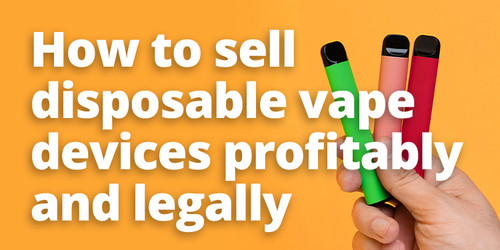How to sell disposable vape devices profitably and legally
Published by James Dunworth
If the vape industry can be characterised by a series of trends which started with a basic cigalike device, the latest big trend is disposable devices.
Simply put, the market is huge. E-Cig Intelligence estimates the disposable vape market to be worth $3.3 billion (£2.7 billion) and, given both growth and inherent difficulties in measuring the vape market, the actual value is almost certainly much greater.
In this post, we’ll take a look at the disposable vape sector, including the pros and cons of selling disposables, the best brands to sell and tips for retailers who want to be profitable while staying within the law.
Contents
Pros of selling disposable vape devices
High demand
For a market that barely existed two years ago, the growth in disposable vape sales has been stupendous. The Google Trends graph below shows how interest has changed over the last two years. This has been reinforced by businesses I have spoken to, who have also described high sales for disposable vape devices.
While the interest may be plateauing, it does mean there is currently a very high demand for disposable vape devices. What’s more, our own experience is that this demand is not yet cannibalising demand for e-liquid or reusable vape devices.
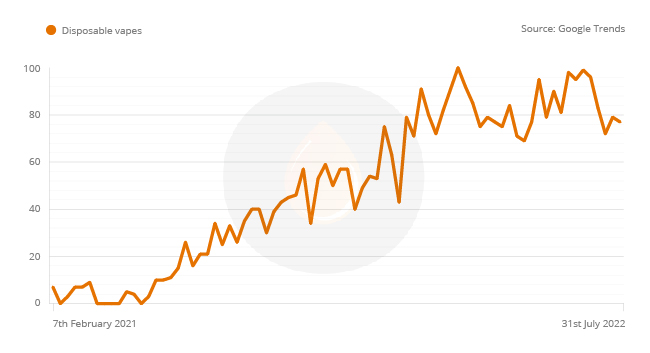
Margin
E-liquid has seen sustained margin pressure for years. That has been exacerbated by shortfills, with larger bottles meaning reduced revenue and profit per ml. However, despite the presence of a lithium-ion battery, the margin per ml is much higher for disposable vape devices than it is for bottled e-liquids.
Bringing new customers into vaping
It wasn’t long ago that the vape market had stalled. There are still millions of smokers in the UK, but in 2020, according to an Action on Smoking and Health report, the number of vapers in the UK fell for the first time. The disposable vape market has the ability to bring smokers on to vaping, some of whom will progress to more advanced devices.
Little expertise needed
Any good vape retailer will need a fair amount of expertise in order to diagnose a smoker's needs, recommend the right device and e-liquid, demonstrate how to use devices and troubleshoot ongoing issues. In contrast, disposables are so simple they need next to no explanation and very little technical support.
Reduced issues
Again, being so simple disposable devices need little after-sales support. For example, one of the biggest issues with reusable devices is burnt coils (often caused by users not priming their coils). As disposable vape devices are often thrown away before they can develop problems, the need for after-sales support is minimised.
Reduced time per sale
Choosing a refillable device and e-liquid can take time and consultation with staff. In contrast, disposable users typically walk in, tell you what they want, buy it and leave.
Cons of selling disposable vape devices
Supply
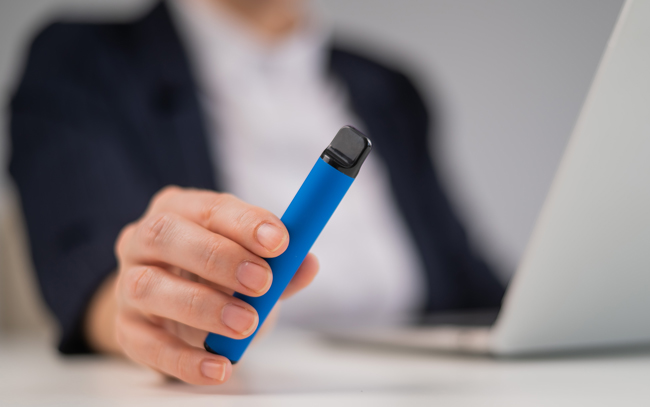
Demand has grown so quickly that manufacturers are struggling to keep up - and at times it can be difficult to get supplies of disposable vape devices, especially for low or zero nicotine strengths.
Environment
The massive great elephant in the room is the environmental impact of disposable devices. Disposable devices contain a lithium-ion battery that is thrown away after a single use when they could be re-used hundreds of times. Theoretically, they could be recycled, but in practice it’s hard.
For that reason, we think it is essential that responsible vape shops should try and switch vapers to re-usable devices when they can.
Under-age vapers
Unfortunately, disposable vape devices are being used more by people under the age of 18. Research by Action on Smoking and Health (ASH) has found that the number of young people regularly vaping has grown from 4% to 7%, with the vast majority using disposable brands such as Elf Bar. (This does come with the caveat that the vast majority of regular users had previously smoked.)
Disposable vape devices and the law
Do you need a licence to sell disposable vape devices in the UK?
At the time of writing, you do not need a licence to sell vape devices, including disposable vape devices. The UK Vape Industry Association is currently calling for vape retailers to be licenced, so it’s possible this may change in the future.
Age checking
Children do try to buy vape devices. Selling to someone under the age of 18 is a criminal offence that can lead to prosecution and fines of up to £2,500. The only defence against accidentally selling to a child is a robust age-checking procedure.
For tips on how to prevent underage sales see our guide to vape age restrictions.
WEEE regulations
WEEE regulations regulate the sale and collection of electronic devices, which means you need to accept and process disposable devices that have been bought from you. See Environment Law for more information.
What else do I need to know?
The regulations for disposable vape devices are exactly the same as those for every other vape device. That means all devices must be registered with the MHRA, have a 2ml e-liquid capacity limit and a nicotine limit of 20mg (2%).
Unfortunately, not every trading standards team understands the regulations, in part due to incorrect guidance being issued. See our guide to disposable vape device regulations to understand the challenges, the correct regulations and where to get support.
Top disposable brands to sell
Elf Bar are currently the top brand you can sell - and not by a small margin. In fact, the search volume for Elf Bar in the UK is 200 times that of IVG Bar, which is the best selling UK-based disposable device.
That’s all changed at an astonishing rate. Just months ago Geek Bar was the most popular disposable, but interest in Geek Bar has fallen off a cliff at the same time as interest in the Elf Bar has increased.
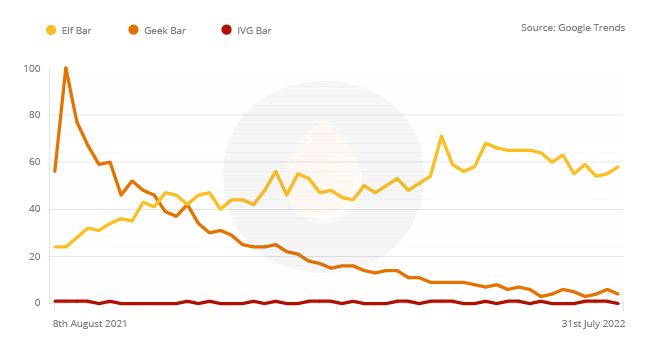
The IVG Bar, especially in new formats such as the IVG Bar Diamond, is still a great second bar to sell, and in our opinion outperforms the Elf Bar in terms of battery life, cloud production and taste.
Advice for vape retailers
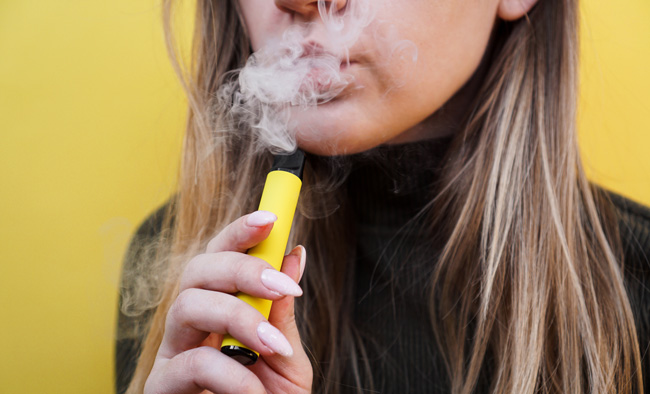
Be prepared to act fast
As already mentioned, the speed at which trends can change in the disposable vape device sector is astounding. Elf Bar came from nowhere, replacing Geek Bar in a matter of months, and it is quite possible that brand positioning will change again. It’s well worth keeping an eye on trends and be prepared to introduce up and coming brands fast.
Include multiple nicotine strengths
Many users are keen to use lower nicotine strengths than the 1.8mg or 2mg options commonly available. When possible (supply permitting) include these options in your range.
Have simple re-usable options for disposable device users
Some disposable vape users may become concerned with the cost or the environmental impact of vape devices. It’s a good idea to have simple pod devices available for these customers to transition to. Popular upgrades from disposables include the Hexa and the Xros Mini.
Keep disposables behind the counter
Small and compact, disposable vape devices are easy to steal. Ensure all disposable vape devices are kept behind the counter or in a locked display cabinet.
Have a flavour menu
Since Covid, vape shops have been unable to let customers ‘try before they buy’. A compromise is to provide a flavour menu for customers, so they can flick through it before they make their purchase. This can also reduce the amount of time your staff need to spend explaining the different flavours.
Wrapping up
There’s no doubt that disposable vape devices have been a game changer for the industry. After a series of knocks in recent years, many vape businesses are now benefiting from their immense popularity. They do come with their own set of challenges, and of particular concern is their impact on the environment. However, vape businesses do have a unique opportunity to use their expertise and passion to help users switch to alternative devices which are both better for the environment and for users' pockets.
Further reading:
Stocking Vape Products - A Guide for Retailers

